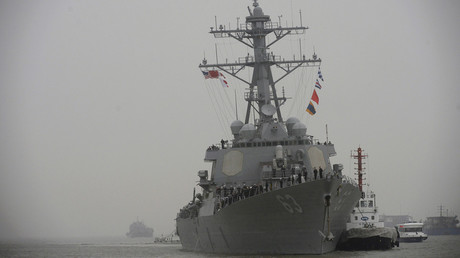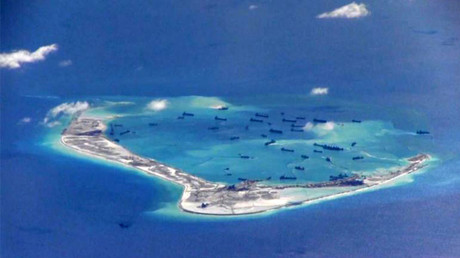
“US forces operate in the Asia-Pacific region on a daily basis, including in the South China Sea,” US Navy Commander Gary Ross told the South China Morning Post newspaper in an email.
The newspaper asked Ross whether the so-called ‘Freedom of Navigation Operations’ (FONOPs) had been halted, as the US hasn’t carried out patrols since President Donald Trump assumed office.
“We are continuing with regular FONOPs, as we have routinely done in the past and will continue to do in the future,” Ross replied, adding that the patrols were “not about any one country.” He did not mention China in his statement, the newspaper said.
Commander Ross’s comments echoed a statement made by US Pacific Fleet Commander Scott Swift at a briefing in Singapore on Monday.
“We just went through a change in administration,” Bloomberg quoted Admiral Swift as saying. “I am not surprised that process has continued in a dialogue as the new administration gets its feet on the ground and determines where would be appropriate to take advantage of these opportunities and where we may want to wait.”
Admiral Swift stressed that a pause in conducting FONOPs doesn’t mean the Trump administration has lowered its priority level for the disputed waterway, saying there was “no change in policy” towards the region.
Meanwhile, several navy requests to sail within 12 nautical miles of disputed islets in the South China Sea have already been declined under the Trump administration without even making it to the White House, according to a New York Times report.
Similar requests were also declined during the presidency of Barack Obama, who was frequently criticized by Republicans for not taking a tougher stance against the Chinese presence in the troubled waters. The US carried out six FONOPs from 2013 to 2016 during the Obama administration.
The South China Sea has been at the center of tensions between multiple nations contesting waterway and offshore resources. China, the Philippines, Vietnam, Malaysia, Brunei and Taiwan – which Beijing considers part of its territory – have overlapping claims in the region.
The Spratly Islands archipelago, through which some $5 billion worth of trade passes each year, is the main disputed area of the region. The archipelago comprises some 14 islets and dozens of reefs and shoals scattered roughly near the middle of the South China Sea.
While the islets are disputed by multiple nations, China has actively pursued construction on the archipelago, building various military facilities on the islets, including several runways. While the US, among others, has claimed that Beijing has been creating “artificial islands” on top of the tiny uninhabited reefs, China has denied such accusations.
Tensions in the region spiked in July 2016 when the United Nations court of arbitration ruled that there was no evidence that China ever had exclusive control over the waters or resources, meaning there was “no legal basis for China to claim historic rights.” The court subsequently awarded the Philippines sovereignty rights over the islets.


